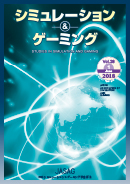Volume 24, Issue 1
Displaying 1-12 of 12 articles from this issue
- |<
- <
- 1
- >
- >|
Papers
Refereed Paper
-
2016Volume 24Issue 1 Pages 1-10
Published: March 30, 2016
Released on J-STAGE: November 01, 2019
Download PDF (902K) -
2016Volume 24Issue 1 Pages 11-21
Published: March 30, 2016
Released on J-STAGE: November 01, 2019
Download PDF (724K)
Forum
-
2016Volume 24Issue 1 Pages 22
Published: March 30, 2016
Released on J-STAGE: November 01, 2019
Download PDF (233K) -
2016Volume 24Issue 1 Pages 23
Published: March 30, 2016
Released on J-STAGE: November 01, 2019
Download PDF (256K) -
2016Volume 24Issue 1 Pages 24
Published: March 30, 2016
Released on J-STAGE: November 01, 2019
Download PDF (197K) -
2016Volume 24Issue 1 Pages 25
Published: March 30, 2016
Released on J-STAGE: November 01, 2019
Download PDF (224K) -
2016Volume 24Issue 1 Pages 26-27
Published: March 30, 2016
Released on J-STAGE: November 01, 2019
Download PDF (329K) -
2016Volume 24Issue 1 Pages 28-29
Published: March 30, 2016
Released on J-STAGE: November 01, 2019
Download PDF (219K)
Reports
-
2016Volume 24Issue 1 Pages 30-32
Published: March 30, 2016
Released on J-STAGE: November 01, 2019
Download PDF (712K) -
2016Volume 24Issue 1 Pages 33-34
Published: March 30, 2016
Released on J-STAGE: November 01, 2019
Download PDF (290K) -
2016Volume 24Issue 1 Pages 35-37
Published: March 30, 2016
Released on J-STAGE: November 01, 2019
Download PDF (263K)
Editor’s Note
-
2016Volume 24Issue 1 Pages 38
Published: March 30, 2016
Released on J-STAGE: November 01, 2019
Download PDF (176K)
- |<
- <
- 1
- >
- >|
